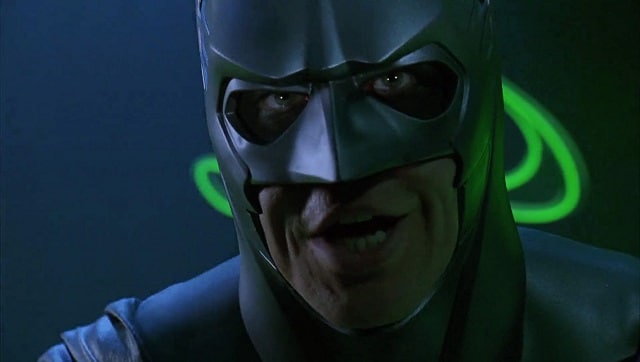Joel Schumacher rescued Batman from Tim Burton's grimness with his signature campiness, winking theatricality
Before Joel Schumacher took over as the director, Warner Bros felt Tim Burton's Batman films were less comic-book movies than graphic-novel movies.

When news broke Monday of director Joel Schumacher’s death, many obituaries led (as he might have expected) with the Caped Crusader. He steered “the Batman franchise into its most baroque territory,” wrote The Associated Press.
That is putting it mildly. The overt campiness and winking theatricality of Schumacher’s Batman Forever and Batman & Robin have long been a point of polarisation among fans of comic book movies, particularly as a darker aesthetic, first established by Tim Burton, and then cemented on movie screens by Christopher Nolan and Zack Snyder, has come to define the character. But Schumacher’s approach may well have saved the franchise. (And then, two years later, nearly sunk it.)
Schumacher seemed, to some, like an unlikely candidate to take the Bat-baton (Baton?) from Burton. But throughout his career, there was rarely a specific idea of a “Joel Schumacher film”; he was closer to the filmmakers of the classic studio system, a journeyman who could take on just about any assignment he was tossed, deliver it on time and on budget, and generate a profit. So he dabbled in rowdy comedy (D.C. Cab), touchy-feely dramedy (St. Elmo’s Fire), romantic comedy (Cousins), horror (The Lost Boys), and sci-fi (Flatliners). Warner Bros handed him Batman based on the success of his adaptation of John Grisham’s legal thriller The Client.
Related Articles
It is easy to forget how necessary that hand-off was deemed at the time. Though Batman Returns, Burton’s 1992 sequel to the record-breaking 1989 Batman, was a commercial success, its grosses fell far short of its predecessor’s. And while critical reaction was mostly positive, some complained about its gloomy tone (Roger Ebert called it “odd and sad”).
Plenty of parents agreed, put off by both the dark violence and the subtle, leather-heavy kinkiness of the relationship between Batman and Catwoman. The studio partnered with McDonald’s on Happy Meal tie-in for the PG-13-rated film but no one at the fast-food giant had even seen the film when it devised the campaign. A McDonald’s spokesman later told The New York Times that the promotion “wasn’t intended to encourage young kids to see the movie.”
In a July 1992 report in Entertainment Weekly on the relative disappointment of Returns, Steve Daly whispered, “Word is they intend to make sure that Batman 3 and its progeny showcase a much less dark Dark Knight — a kind of ‘Batman Lite’ — possibly without Burton at the helm.” That is exactly what happened, and that is exactly what they got.
Schumacher’s critics (and there were many) often gleefully noted that his training was not in filmmaking but fashion, entering the film industry as a costume designer. But that eye for flash and style was clearly what Warner Bros felt the franchise needed at the time, after the bleak and borderline monochromatic look of Burton’s Batmen — which were less comic-book movies than graphic-novel movies, taking visible pains to separate themselves from the campy and colourful 1960s television series that still loomed large in the popular imagination.
Batman Forever, on the other hand, opened its arms to that influence. The screenplay — credited to Lee Batchler, Janet Scott Batchler, and Akiva Goldsman — is gleefully goofy, filled with corny one-liners and leering double entendres. Schumacher and his cinematographer, Stephen Goldblatt (nominated for an Oscar, one of the three nominations the film received), cram their Dutch-angled frames with candy-coated colors, neon lights, and billowing dry ice, while Elliot Goldenthal’s musical score takes the orchestral pomposity of Danny Elfman’s earlier Batman themes, and cranks it up to 11. The performers similarly go for the gusto: Jim Carrey is at his most unhinged (no small achievement), Tommy Lee Jones chews scenery like it is his first meal in weeks, and Nicole Kidman vamps it up like the daughter Marlene Dietrich did not know she had.
Reviews were more mixed for Forever — The New York Times critic called it, ironically enough, “the empty-calorie equivalent of a Happy Meal” — but audiences were ecstatic. It out-grossed Batman Returns both domestically and internationally. Warner Bros quickly signed Schumacher for another instalment.
Alas, he fell into something of the same trap as Burton; taxed with reprising a mega-success, he leaned so far into his stylistic flourishes that he alienated a mass audience. Batman & Robin has acquired a reputation as one of the worst blockbusters of all time, and it is not entirely unearned. Sloppy, overcooked, and painfully unfunny, it feels like exactly what it was: a filmed deal.
That failure caused a bit of retroactive conflation of the two Schumacher pictures, which is unfortunate. Batman Forever may not have proven a bellwether of big-screen superhero entertainment, though a dose of self-aware silliness would not hurt the Very Serious Filmmakers at both Marvel and DC one bit. But it may be the most succinct encapsulation of the Schumacher style: a big and gaudy, colourful and stylish, cheerfully unapologetic crowd-pleaser.
Jason Bailey c.2020 The New York Times Company
also read

Actor-politician Jaya Prada sentenced to 6 months imprisonment and Rs 5000 fine by a Chennai court
The verdict comes after a complaint filed against Prada and her two business partners by the Labour Government Insurance Corporation

K-pop star Suga becomes 3rd BTS member to begin military service in South Korea
In South Korea, all able-bodied men aged 18 to 28 are required by law to perform 18-21 months of military service under a conscription system meant to deter aggression from rival North Korea

Kalki Koechlin recalls being trolled for her pregnancy without marriage, says, 'It was a conscious decision'
The actress stated, "Because I was already divorced, he was like I am not interested in marriage. We just took a conscious decision not to marry. But, we were living together."



